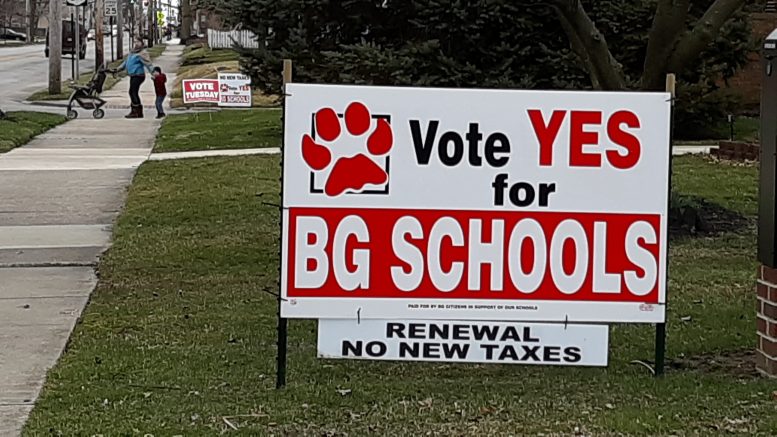By JAN LARSON McLAUGHLIN
BG Independent News
After stinging defeats on the last three ballots for a new building, Bowling Green City School District experienced a sweet victory Tuesday.
The school district’s two levies for operating expenses passed – and were turned from five-year to continuing levies.
“This is finally validation that we matter,” Board of Education President Ginny Stewart said after the results came in. “This is validation of the exemplary work our entire staff, administrators and superintendent do every day.”
The Tuesday tallies are far from the final election results, since the primary was turned into a mail-in election and ballots postmarked by Monday will be accepted as they arrive at the Wood County Board of Elections.
But as of Tuesday night, the preliminary counts for the two Bowling Green school issues were:
- Renewal of a 4.2-mill current expense levy for current expenses: Yes: 4,100 (67%) No: 2,024 (33%)
- Substitute 1.35-mill emergency levy to avoid operating in a deficit: Yes: 3,621 (60%) No: 2,452 (40%)
“This is really great news,” Superintendent Francis Scruci said of the victories. “I believe it’s a resounding statement from our community that they truly appreciate the work we do for them.”
Both operating levies had been approved by district voters before – but this time, the district was asking citizens to turn them into continuing levies. By making them continuing issues, the board would not have to keep coming back to voters to ask for the same money.
The school district has not asked for new money for 10 years – and still didn’t ask for more with these renewal levies.
“The good news is we don’t have to worry about the operations of the district,” Scruci said.
When the original March 17 primary election was called off, and replaced by a mailed in election due to the coronavirus pandemic, school officials understood the reason for the change.
But they also worried that the delay in the election, and the tough times brought on by the pandemic, could hurt the levies at the polls.
“This whole COVID-19 has really changed people’s lives,” Stewart said.
But even in the midst of that chaos, voters were willing to support the district, she said.
“They are paying attention to what we bring to the table in this community,” Stewart said, adding that the state-ordered closures resulted in citizens seeing the district’s efforts to not only continue educating students, but also feeding them, and providing them with personal hygiene items.
“This gives the community another example of how valuable this district is,” Stewart said.
Scruci thanked the voters and campaign committee led by Ben Otley for the victory.
“We can’t thank the community enough for their support,” he said.
But Scruci also put the election in perspective.
“Obviously this is really great news, but we are still sitting in the middle of a coronavirus pandemic,” he said.
The switch to continuing levies was recommended by the board’s financial consultant, David Conley.
Conley said the district must maintain a large budget carryover each year since 21% of the district’s revenue was from levies that could disappear if they don’t get repeated approval from voters.
Without them, the district would face inevitable cuts to programs and staff.
There are upsides to turning the five-year levies into continuing levies, according to Conley.
First, the district reduces the number of times it has to ask voters for the same money. Without changing the taxing structure, the district could have faced 20 ballots over the next 25 years, Conley said.
Second, having continuing levy support would help the district’s five-year forecast. Since that income would then be guaranteed, the district could get by with lower reserves. Right now, without continuing levy support, the district should not allow its balance to go below $8 million, Conley said.
Third, having continuing levies would allow for more precise long-term planning.
Other benefits to the district of continuing levies include higher bond ratings, preservation of rollbacks for taxpayers, and the ability to capture tax revenue on new development in the district.
But the board worried about the downside of changing the five-year issues to continuing levies – since some voters like the district having to come back every five years for their approval – even though it’s not new money.
And if the voters rejected the levies based on their continuing status, the board would not be able to renew them – and rollback benefits would be lost for taxpayers.
The board was in agreement that keeping the rollback benefits for taxpayers is important. In 2013, the state decided to stop paying the 12.5 percent rollback on school levies – leaving taxpayers to foot the entire bill.
However, the state will continue paying that percentage on any levy amounts approved prior to 2013. So if the millage is kept the same, and voters approve a renewal, they will still benefit from the rollback.

